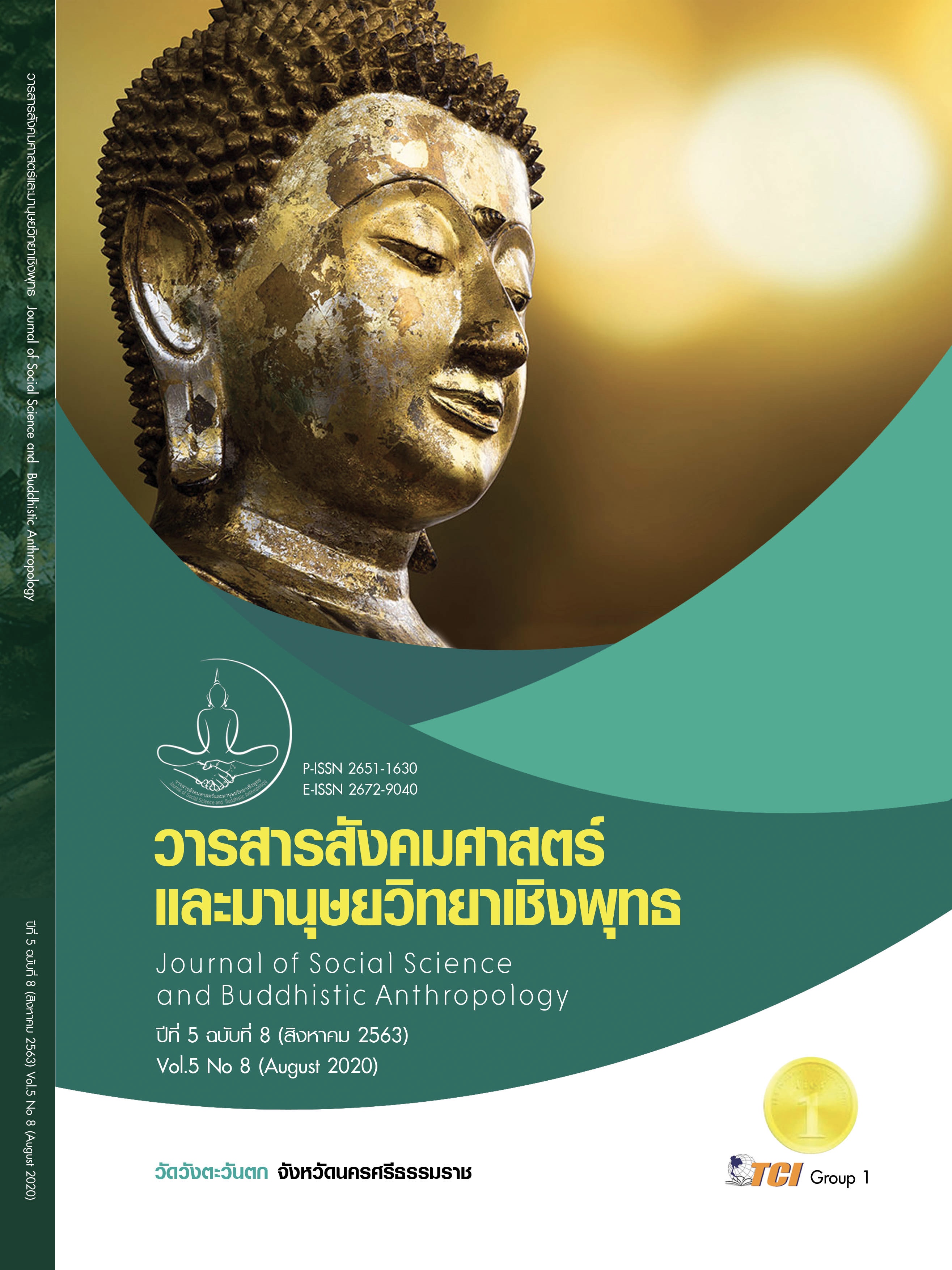APPLYING THE ROYAL SUFFICIENCY ECONOMY PHILOSOPHY TO THE WAY OF LIFE OF THE BORDER PATROL POLICE (BPP.)
Keywords:
The Royal Sufficiency Economy Philosophy, Border Patrol Police (BPP.), Way of lifeAbstract
The objective of this article is to study 1) level of knowledge, attitude, and behavior to bring the Sufficiency Economy Philosophy to the way of life of Border Patrol Police. 2) knowledge and attitudes towards the Sufficient Economy Philosophy affecting the behavior of applying the philosophy to the way of life of Border Patrol Police and 3) guidelines for applying the Sufficient Economy Philosophy of the Border Patrol Police to distribute to people in the area. Mainly using quantitative research together with qualitative research. The quantitative sample was border patrol police, which were teachers at the 371 from Border Patrol Police School and 17 the main informants of the Border Patrol Police Bureau.The research showed that 1) Border Patrol Police (BPP) have the knowledge of the philosophy of the sufficiency economy and have the behavior to apply the philosophy of the sufficiency economy to the way of life of the border patrol police at the highest level, while the attitude towards the philosophy of the sufficiency economy has a high level. 2) Attitudes significantly affect the behavior of sufficiency economy philosophy towards the border patrol police way of life in the same direction. While,the knowledge affects behavior and attitudes with no statistical significance, it is explained that attitude variables are more important than knowledge variables.3) Guidelines for bringing the philosophy of sufficiency economy to the way of life of border patrol police have been distributed to the local people, behavior, model, develop oneself, and be self-reliant ready to face various situations in the wilderness. There is communication of concepts and coordination with various activities with students, parents and expanding to the community.
References
เกษม วัฒนชัย. (2555). ปาฐกถาเรื่อง “เศรษฐกิจพอเพียงกับการจัดการศึกษาของชาติ” ในงานประชุมมูลนิธิสถาบันวิจัยและพัฒนาประเทศตามปรัชญาของเศรษฐกิจพอเพียง. เรียกใช้เมื่อ 1 มิถุนายน 2561 จาก https://www.isranews.org/community/comm-interview/.
ดุจเดือน พันธุมนาวิน และดวงเดือน พันธุมนาวิน. (2550). หลักเศรษฐกิจพอเพียงในระดับบุคคล: ทฤษฎีและผลการวิจัยเพื่อสร้างดัชนีในแนวจิตพฤติกรรมศาสตร์. วารสาร พัฒนบริหารศาสตร์, 47(1), 27-80.
ดุสิต น้อยชื่น และคณะ. (2557). ยุทธศาสตร์การพัฒนาตำรวจตระเวนชายแดนเพื่อความมั่นคงตามแนวชายแดนไทย. วารสารบัณฑิตศึกษามหาวิทยาลัยราชภัฏวไลยอลงกรณ์ ในพระบรมราชูปถัมภ์, 8(1), 52-70.
ทวีศักดิ์ เทพพิทักษ์. (2556). การใช้แบบจำลอง KAP กับการศึกษาพฤติกรรมและทัศนคติการป้องกันการติดเชื้อ เอช ไอ วี / เอดส์ ของคนประจำเรือไทย. วารสารวิทยาการจัดการ มหาวิทยาลัยราชภัฎเชียงราย, 8(2), 84 - 102.
พัชรี ปานแก้ว. (2557). ทัศนคติต่อหลักปรัชญาของเศรษฐกิจพอเพียง คุณภาพชีวิตการทำงาน และพฤติกรรมการเป็นสมาชิกที่ดีขององค์การและสังคม. วารสารมหาวิทยาลัยศิลปากร ฉบับภาษาไทย, 34(2), 1-22.
วรเดช จันทรศร. (2554). การจัดการภาครัฐตามหลักปรัชญาของเศรษฐกิจพอเพียง. (พิมพ์ครั้งที่ 1). กรุงเทพมหานคร: มหาวิทยาลัยราชภัฏสวนสุนันทา.
วลัยพรรณ จันทร์หอม. (2553). การนำหลักปรัชญาเศรษฐกิจพอเพียงมาใช้ในการดำเนินชีวิตของครูโรงเรียนกาญจนานุเคราะห์ จังหวัดกาญจนบุรี. กรุงเทพมหานคร: มหาวิทยาลัยราชภัฏสวนสุนันทา.
วิสาขา ภู่จินดา. (2557). การจัดทำตัวชี้วัดการจัดการสิ่งแวดล้อมชุมชนเมืองและชุมชนชนบทโดยยึดหลักปรัชญาของเศรษฐกิจพอเพียง. กรุงเทพมหานคร: สถาบันบัณฑิตพัฒนศาสตร์.
สำนักงานคณะกรรมการพัฒนาการเศรษฐกิจและสังคมแห่งชาติ. (2558). รายงานผลการปฏิบัติราชการตามคำรับรองการปฏิบัติราชการระดับสำนัก ประจำปีงบประมาณ พ.ศ. 2558. กรุงเทพมหานคร: สำนักนายกรัฐมนตรี.
สำนักงานโครงการสมเด็จพระเทพรัตนราชสุดาฯ สยามบรมราชกุมารี. (2557). โรงเรียนสังกัดกองบัญชาการตำรวจตระเวนชายแดนประจำปีการศึกษา 2557. กรุงเทพมหานคร: สำนักงานโครงการสมเด็จพระเทพรัตนราชสุดาฯ สยามบรมราชกุมารี.
สำนักงานตำรวจแห่งชาติ. (2539). กองบัญชาการตำรวจตระเวนชายแดน 50 ปี โรงเรียนตำรวจตะเวนชายแดน. กรุงเทพมหานคร: สำนักงานตำรวจแห่งชาติ.
สำนักงานตำรวจแห่งชาติ. (2550). กองบัญชาการตำรวจตระเวนชายแดน 50 ปี โรงเรียนตำรวจตะเวนชายแดน. กรุงเทพมหานคร: สำนักงานตำรวจแห่งชาติ.
สำนักงานตำรวจแห่งชาติ. (2557). คุณลักษณะของตำรวจตระเวนชายแดน. เรียกใช้เมื่อ 9 มิถุนายน 2561 จาก https://www.Thairath.co.th/content/403018
สุชีรา ธนาวุฒิ. (2559). การศึกษาขั้นตอน รูปแบบ วิธีการนำปรัชญาของเศรษฐกิจพอเพียง ไปปฏิบัติจริงในการพัฒนาธุรกิจ. ใน ดุษฎีนิพนธ์ปรัชญาดุษฎีบัณฑิต สาขาวิชาการพัฒนาองค์การและการจัดการสมรรถนะของมนุษย์. วิทยาลัยพาณิชยศาสตร์ มหาวิทยาลัยบูรพา.
อรวรรณ ป้อมดำ. (2561). การขับเคลื่อนศูนย์การเรียนรู้ ตามหลักปรัชญาของเศรษฐกิจพอเพียงในสถานศึกษา สังกัดสำนักงานเขตพื้นที่การศึกษาประถมศึกษาลพบุรีเขต 2. กรุงเทพมหานคร: กระทรวงศึกษาธิการ.
Banaji, M. & Heiphetz, L. (2010). Attitudes. Handbook of social psychology. (5th ed). New York: John Wiley & Sons.
Bano, R. et al. (2013). A comparative study of knowledge, attitude, practice of nutrition and non-nutrition student towards a balanced diet in Hail University. IOSR Journal of Nursing and Health Science (IOSR-JNHS), 2(3), 29-36.
Bolisani, E. & Bratianu, C. (2018). The elusive definition of knowledge. In Emergent knowledge strategies: Strategic thinking in knowledge management. Cham: Springer International Publishing.
Cronbach, L. (1963). Educational psychology. (2nd ed). New York: Harcourt.
Good, C. V. (2009). Attitude. Retrieved June 12, 2018, from from http://www.novabizz.Ace/ Attitude.htm
Guyer, J. & Fabrigar, L. (2015). A review of the history. In J. Wright & J. Berry (Eds.). International Encyclopedia of Social and Behavioral Sciences, 2(1), 183-189.
Khazanie, R. (1996). Statistics in a world of Applications. (4th Ed.). New York: Harper Collins College Publishers.
Lazzeri, F. (2014). On Defining Behavior: Some Notes. Behavior and Philosophy, 42(2014), 65-82.
Lefton, L. A., & Brannon, L. (2008). Psychology. New York: Pearson Education.
Likert, R. (1967). The method of constructing and attitude scale, reading in attitude theory and measurement. New York: Wiley & Son.
Nevid, J. S. (2013). An introduction to psychology. (4th ed.). Connecticus: Wadsworth Publishing.
Newstrom, J. W., & Davis, K. (2002). Human behavior at work: Organizational behavior. (8th ed). New York: McGraw-Hill.
Triandis, H. C. (1980). Values, attitudes, and interpersonal behavior. Nebraska Symposium on Motivation, 27(1979), 195–259.
Turban, E. et al. (2001). Introduction to information technology. Toronto: John Wiley & Sons.
Yamane, T. (1973). Statistics an introductory analysis. (3rd ed.). New York: Harper and Row.









